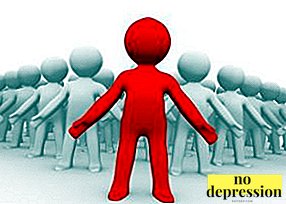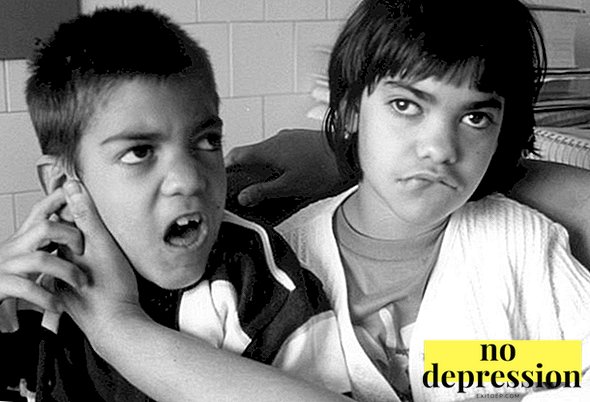Every social group has man influencing the rest its members.
Psychologists describe the signs and features of the leadership phenomenon, which can be formal or informal.
Leadership concept

Leadership - is a system of functioning of a social group, in which there is a specific leader in the group.
This person organizes the rest, makes key decisions, acts as an authority, is able to lead.
He takes responsibility for making decisions that are important to all members of the group. Wherein other participants recognize his authority and listen to his opinion.
The concept of leadership is actively used in psychology, management, sociology, political science and other disciplines. For this reason, there are many approaches to the study of this phenomenon.
Also, experts have developed several different classifications of the types of this phenomenon.
Signs of
The presence of a leadership system in a group is indicated by the recognition by a majority of its members of the authority of a person.
This person makes decisions, organizes activities, is responsible. Key features leader:
- Foresight. He is able to predict the development of events and convince others of the correctness of the chosen strategy.
- Thoughtfulness. He always approaches to solving any problems calmly and rationally, without any fuss or hasty conclusions.
- The ability to understand people. He understands the essence of the person, the strengths and weaknesses of the individual. This helps to objectively assess the abilities of each and make the most competent use of these abilities in a common cause.
- Activity. This position is very difficult emotionally, since responsibility is always a source of stress. The leader must be physically and psychologically resilient, only in this case the burden placed on him will be feasible.
- Determination. Failures do not become a reason for abandoning their ideas, but are perceived as useful lessons on the way to achieving the set objectives.
Facing difficulties does not confuse, but only stimulates to look for ways to overcome them.
- Sequence. People feel comfortable only when the reality around them is predictable and stable. It is the ability to build the correspondence between the chosen strategies, the techniques used and the achievement of the expected results is the key to the confidence of the group members. The inconsistency and variability of the leader always cause the destruction of any communities.
- Justice. A team or a social group will trust someone who equally treats all people around him without exception. The presence of pets and approximate always leads to a deterioration of the psychological climate in any group.
- Cold mind Often it is necessary to make decisions instantly to save the general idea, but they can infringe upon the rights of individuals. Often you need to sacrifice less so as not to lose more. Extra emotionality and gentleness do not benefit the leader, who must always be guided by rational considerations.


Functions
The main functions that the leader performs in a social group:
- forecast the development of events and take measures to develop an action strategy;
- to take responsibility;
- assign tasks to team members;
- assign responsibilities in accordance with the abilities of each participant;
- provide moral and practical support in solving problems;
- motivate to achieve high results;
- seeks to achieve common, not personal interests;
- in case of failure be responsible for the mistakes made.
Formal and informal

All experts tend to divide the leaders into two types: formal and informal.
Formal (nominal) - a person who occupies a certain social status or position, in accordance with which he is vested with certain powers.
it executives at various levels: department heads, managers, directors, etc. Such people are personally responsible for the mistakes made by their team. Their task is the organization of work, the achievement of goals.
Informal (real) - a person who is respected and appreciated by all members of a group, not because of his status or position, but because of his moral qualities. Such a person has a mind, charisma, charm.
It is always a strong and positive person who inspires confidence in others and calm. He is able to influence the members of the group and direct their activities.
What is the difference?
Formal leader is always acts within the powers vested in him. If his professional qualities correspond to his position and are supplemented with high moral characteristics, then such a leader can have real power over the team.
If the level of his professionalism does not inspire confidence of subordinates or personal qualities interfere with the establishment of a positive psychological climate in the team, then the function of the leader remains only nominal.

Group members will obey such person only as part of their duties, but there will be no talk of recognition of authority here.
Informal leader has the ability influence the rest of the group thanks to their business and personal qualities.
In the work collective, real representatives of the government, as a rule, are experienced specialists with a high level of knowledge of their duties.
In addition to professionalism, these people demonstrate self-confidence, reliability, responsibility. They are also always charming, sociable, fair. Such informal authority has much more powerthan a real leader.
This is explained by the fact that in an organization with a full-fledged acting leader who is respected by subordinates, an informal leader in principle cannot appear.
Formal and informal leadership - what it means and what is the difference:
Features of the nominal leader
The following features are peculiar to such a person:
- Appears and disappears according to circumstances.. This happens during various transformations, crises, etc. For example, a change in formal leadership can lead both to the emergence of the role of a real leader and to the abolition of the need for it. There may also be a change in the leaders themselves, depending on the prevailing circumstances.
- Can effectively interact with other leaders. Often in a social group there are several people who occupy key positions. At the same time, their spheres of influence do not overlap, and joint efforts are directed towards the achievement of a common goal.
It is this effective interaction often gives truly meaningful results.
- Dedicated to the common cause. Coordinates the actions of team members to achieve the objectives. Interested in the integrity of the team and the effectiveness of its activities. He applies his influence and authority not for the purpose of achieving personal interests, but solely for the purpose of solving common tasks.
- Internally loves manipulate people. Whatever good intentions lead the actions of an informal leader, he does not choose his position by chance. It is always a person who likes to have power over other people and influence the course of events. For this reason, real leaders often dream of becoming formal leaders in the depths of their souls, as this will endow them with official authority.


The role of a real leader
A real leader can fulfill several different roles:
- "Conductor". Performs the task assigned to him by the leadership, not seeking to excessive democracy. He builds relationships in a team in accordance with the course set by his superiors. It is important for him to recognize his own importance due to the need for guidance of his leadership.
Distinguished by performance and friendliness, so slowly but surely moving up the career ladder.
- "Shirt-guy". Sociable and charming person who is easily rubbed into the confidence of individual members of the team. With the help of a positive attitude that infects other people, sets up colleagues to perform initially tedious and routine tasks with enthusiasm. Feels the pleasure of feeling that is with the leaders on the same level.
- "Eminence grise". A secretive and slightly boring person who prefers to act quietly and effectively. He is pleased to be formally on the sidelines, perfectly aware of the real importance of his position. Such a secret power gives him pleasure. Draws attention to the little things and nuances, so that always finds an approach to any person. Excellent manipulator and first-class strategist.
- "Rebel". He chooses his position as an unwritten leader only because of the desire to influence the masses in order to organize a riot. The purpose of his activity is to set conditions, fight for rights of disadvantaged and other aggressive actions that are not directly related to the real goals of the group. He fights for the sake of the struggle itself, and the ultimate goal is secondary.

When does the informal become a nuisance?
In a situation where an informal leader acquires too much power, there is a serious threat of losing influence from a real leader. Especially if the manager is not initially trusted by the team.
Begin to question the decisions and orders of the headthat undermines its credibility. There is a power struggle, in which the rest of the group are drawn.
Eventually the psychological climate in the team is broken, discipline is decomposed. All this leads to a significant decrease in the motivation to work, loss of interest in work.

Usually active opposition to the leadership is provided by people who occupy an undeservedly low position (according to their personal conviction).
For example, quite often experienced specialists at the age do not wish to obey the young boss and turn the team against the leadership.
In this situation, the boss must try establish feedback with the team, to exclude the further strengthening of the position of the "non-formal".
Thus, the position of the leader is key in any social group. Depending on the peculiarities of his position, he may be formal or informal.



